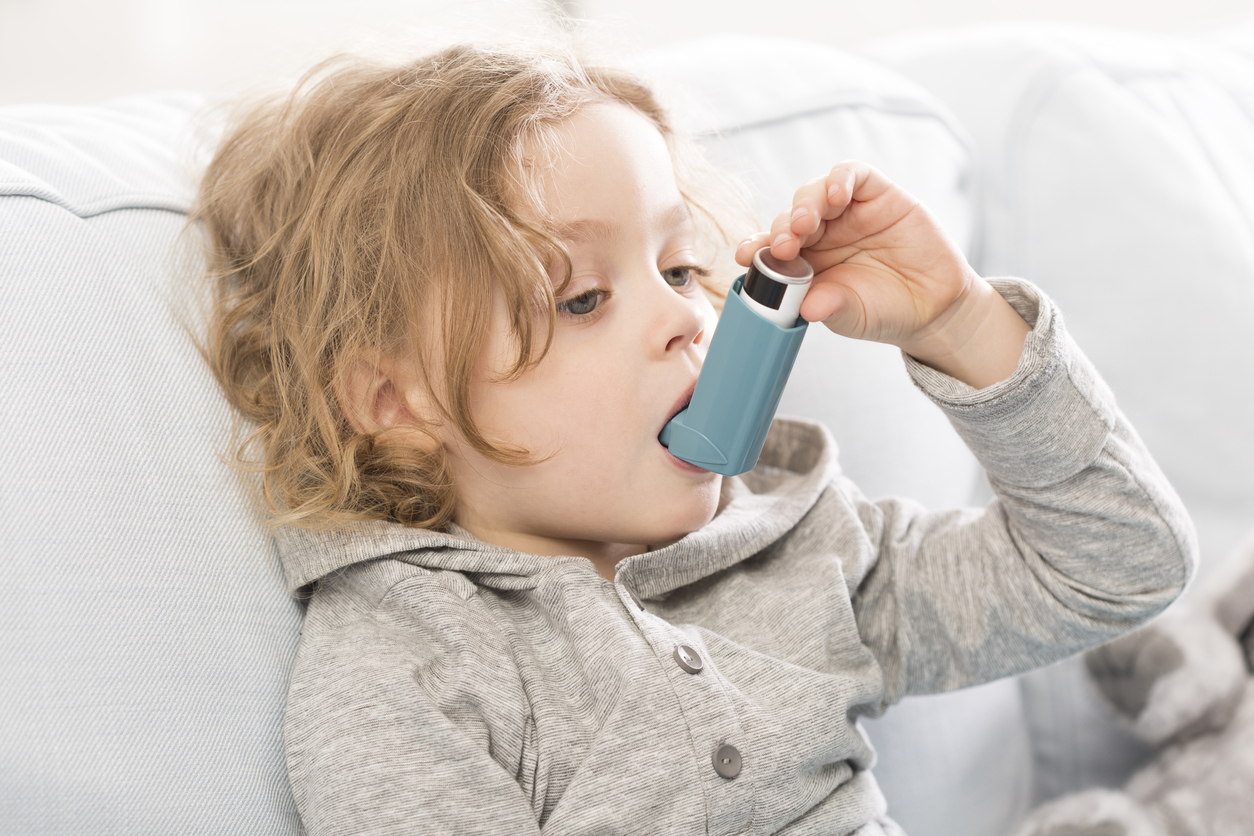Asthma is chronic inflammation of the airways in the lungs which makes the airways prone to episodes of difficult breathing, known as Asthma Attacks. Common triggers include allergies, colds, and exercise. Asthma is controlled by avoiding these triggers when possible and by using medication therapy.
The primary symptoms of asthma are wheezing and coughing, and in children under 5 these can be commonly caused by other conditions, making asthma difficult to diagnose. Also, standard diagnostic testing cannot be used easily or accurately in children under 5 years old. Finally, some treatments available to older children and adults are not available to infants and preschool children.
For these reasons, managing asthma in children under 5 years old can be a challenge. To speak with the top pediatric asthma specialist in New York, consult with Dr. Shukla today.
Asthma Symptoms in Children Under 5
Common asthma signs and symptoms in children under 5 include:
- Cough
- Wheezing, a high-pitched, whistle-like sound when exhaling
- Trouble breathing or shortness of breath
- A tight, uncomfortable feeling in the chest
The severity and patterns of symptoms may vary in these ways:
- Worsening of symptoms at night
- Short periods of coughing and wheezing between periods of time with no symptoms
- Frequent or chronic symptoms with episodes of worse wheezing and coughing
- Seasonal changes based on prevalent infections or allergy triggers
Asthma symptoms may be triggered or worsened by certain events, for instance:
- Colds or other respiratory infections
- Allergy-causing agents (allergens), such as dust, pet dander or pollen
- Activity or exercise
- In infants, feeding
- Exposure to cigarette smoke or other airborne irritants
- Strong emotional reactions, such as crying or laughing
- Gastrointestinal reflux
- Changes or extremes in weather
Asthma Emergencies
Severe asthma attacks can be life-threatening and require emergency room treatment. Signs and symptoms of an asthma emergency in children under age 5 include:
- Gasping for air
- Breathing in so hard that the abdomen is sucked under the ribs
- Trouble speaking because of restricted breathing
Diagnosis and Monitoring of Asthma in Young Children
Medical History
Your doctor will ask some of these questions:
- Is there a family history of asthma?
- How often do symptoms occur?
- Does coughing wake your child at night?
- Do the symptoms accompany a cold or are they unrelated to colds?
- How often do episodes of breathing difficulty occur?
- How long do they last?
- Has your child needed emergency care for breathing difficulties?
- Does your child have any known pollen, dust, pet or food allergies?
- Is your child exposed to cigarette smoke or other airborne irritants?
Laboratory Tests
Other tests may include the following:
- Blood test. Your doctor can measure the levels of certain white blood cells that may be elevated in response to infections.
- Chest X-ray. A chest X-ray may reveal changes in the lung when asthma is moderate to severe. It may also be used to rule out other conditions.
- Allergy test. A skin or a blood test may indicate if your child is allergic to a suspected or likely allergen.
Trial Treatment
If your doctor suspects your young child has asthma, they will most likely prescribe a trial treatment. Trail treatments are meant to test whether asthma is an accurate diagnosis. If you have followed instructions and there is no improvement within the trial period, your doctor will consider another diagnosis.
5 Steps to Asthma Control for Children Under Age 5
Create a written action plan that you can share with family members, friends, preschool teachers, and sitters. Include such things as:
- Your child’s name and age
- Physician and emergency contact information
- The type, dose and timing of long-term medications
- The type and dose of rescue medication
- A list of common asthma triggers for your child and tips for avoiding them
- A system for rating normal breathing, moderate symptoms and severe symptoms
- Instructions for what to do when symptoms occur and when to use rescue medication
Monitor and Record
Keep a record of your child’s symptoms and treatment schedule to share with their doctor. Information you record should include:
- The time, duration and circumstances of an asthma attack
- Treatment responses to asthma attacks
- Medication side effects
- Changes in your child’s symptoms
- Changes in activity levels or sleep patterns
Control Asthma Triggers
Minimize your young child’s exposure to triggers by:
- Cleaning thoroughly to control dust and pet dander
- Checking pollen count reports
- Removing cleaning products or other household products that may be an irritant
- Administering allergy medicine as directed by your doctor
- Teaching your child hand washing and other habits to minimize colds
- Teaching your child to understand and avoid triggers
Pediatric Asthma Specialist in New York
Dr. Mayank Shukla is a pediatric asthma specialist who treats patients with asthma, allergies, and sleep disorders in the New York City area. Dr. Shukla now specializes in the treatment of children with his patient-centered, empathetic approach. Contact Dr. Shukla today to schedule an appointment!

